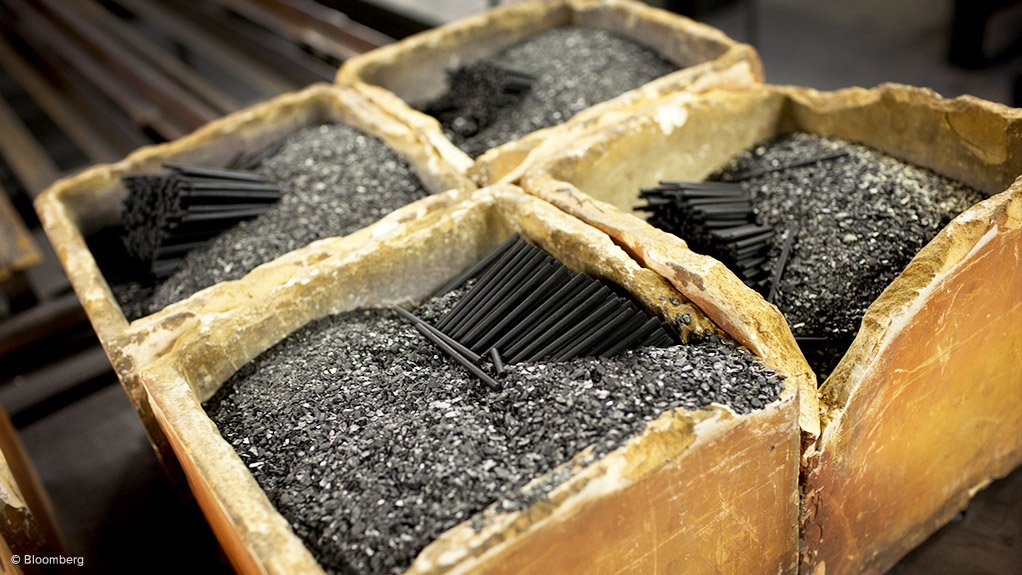Graphite miner Syrah Resources is expecting the global flake graphite market to remain in a state of small oversupply this year but to move into a deficit in the coming years, as the company increases its graphite production ahead of an expected increase in demand from electric cars, buses and trucks in the short term and energy storage in the longer term.
“We expect the overall flake graphite market to move into a deficit from late 2019 to early 2020 as the demand for lithium-ion batteries continue to grow from the demand for electric transport vehicles. We expect global demand to grow by 10% and reach about 780 000 t in 2018, with the incremental demand growth of around 80 000 t – all from the battery sector,” says Syrah Resources MD and CEO Shaun Verner.
Verner adds that the demand profile for flake graphite is under significant disruption. The main demand sector for flake graphite historically has been the steel sector where graphite is used in refractory bricks and crucible linings. The battery sector was responsible for just 17% of global demand in 2017. Verner says he expects this to move to about 25% this year and, by the early 2020s, to be around 50%.
This means the demand for flake graphite from the battery sector will grow from around 200 000 t out of 780 000 t in 2018 to over 500 000 t out of a total global market of just over one-million tons by 2021. “The outlook we see in the demand growth and profile for natural graphite is very similar to that observed for all other lithium-ion battery commodities such as lithium, nickel and cobalt.”
BAM Strategy
Verner tells Mining Weekly that Syrah’s downstream battery anode material (BAM) strategy is to be the first integrated BAM producer outside China using natural graphite from the Balama graphite mine, in Mozambique, as a key raw material. “Syrah has a first mover advantage and with our production of a higher value-added product, we aim to provide the global battery supply chain with a key source of diversification, including spherical graphite products that include unpurified, purified and coated materials.”
Verner explains that Syrah’s initial entry into the BAM market will be low risk, focusing on the milling, shaping and purification of Balama flake graphite, and will build up to cooperation with industry participants to reach higher-margin products over time.
He further elaborates on the company’s sales and marketing strategy – which focuses on having a diversified sales book by selling natural flake graphite to all geographies and sectors of the market – noting that the end markets Syrah has sales contracts with include steel and industrial markets, the expandable graphite market, as well as the fast-growing electric vehicle (EV)battery market.
Sales and qualification of product shipments at Balama started in January. The company shipped its product to clients in Brazil, China, Germany, Japan, India, Indonesia, Italy, Poland, Russia, Taiwan, Turkey and the US. Syrah Resources’ first cash inflow from sales was received in February.
Syrah Resources has received product qualification feedback from more than 20 clients and from about 50 samples sent across battery and industrial markets. The feedback, based on the carbon grade, impurities and particle-size distribution of the product, has been “significantly positive”, adds Verner.
“Syrah is the first significant exporter of natural graphite to China and multiple shipments have been sent to BAM customers to date. We have sales agreements for 50 000 t of flake graphite for Chinese BAM customers this year and we are in the process of further negotiations.
“Syrah Resources, therefore, expects its profile of the sales book to evolve as the global demand profile also evolves and as the company continues to establish itself as a long-term (Balama is expected to be in production for more than 50 years), consistent supplier of high-quality natural flake graphite,” he says.
Market Outlook
Syrah Resources expects the conditions in the lithium-ion battery market to remain strong for the foreseeable future, with Verner highlighting the tripling of installed capacity year-on-year in the first quarter of this year from Chinese battery makers as evidence that “the supply chain buildout is occurring in anticipation of the demand from auto makers to meet their EV plans”.
“The total energy produced by battery makers in 2017 for all transport (cars, buses and trucks), storage and personal device applications was about 120 GWh. But between now and 2025, more than 200 new EV models are on the release agendas of the auto makers and Volkswagen alone expects to require 150 GWh of battery power by 2025.”
On the supply side, Syrah Resources expects China to become a net importer of graphite in 2019/20 as Chinese anode production grows, while further resource depletion leading to mine closures and environmental controls curtail China’s domestic production.
Further, industry interaction continues to highlight lithium-ion as the base battery technology for EVs, and graphite to retain dominance in anodes. “New technologies do not evolve and commercialise quickly, and the vast majority of original-equipment manufacturers, cell material and battery producers are increasing their capacities focused on lithium-ion technology almost exclusively.”
Edited by: Mia Breytenbach
Creamer Media Deputy Editor: Features
EMAIL THIS ARTICLE SAVE THIS ARTICLE
ARTICLE ENQUIRY
To subscribe email subscriptions@creamermedia.co.za or click here
To advertise email advertising@creamermedia.co.za or click here













